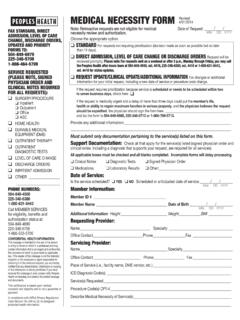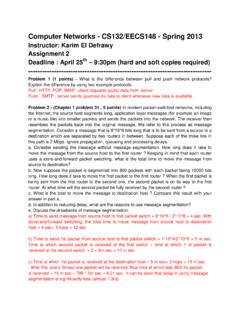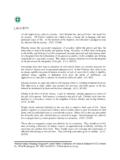Transcription of SUMMARY OF THE BOOKS OF THE BIBLE - Yola
1 SUMMARY OF THE BOOKS OF THE BIBLE . THE OLD TESTAMENT. There are 39 BOOKS in the Old Testament, generally separated into 4 divisions: The Pentateuch or Torah, traditionally designated as the 5 BOOKS of Moses. Historical BOOKS , 12 in number, from Joshua to Esther. Poetical BOOKS , 5 in number, from Job to Song of Solomon. Prophetical BOOKS , 17 in number, including the writings of the 4 Major Prophets, from Isaiah to Daniel, and the 12 Minor Prophets from Hosea to Malachi. THE NEW TESTAMENT. There are 27 BOOKS in the New Testament, generally separated into 4 divisions: The Gospels, 4 in number Historical Book Acts Practical BOOKS The Letters or Epistles, 21 in number Prophetical Book Revelation THE OLD TESTAMENT. THE PENTATEUCH. GENESIS. The word "genesis" signifies "generation" or "origin" and comes from the Greek translation of Genesis 2:4.
2 It is an appropriate title for the first book of the BIBLE , which contains the record of the origin of the universe, the human race, family life, nations, sin redemption, etc. The first 11 chapters, which deal with primeval times, present the antecedents of Hebrew history from Adam to Abraham. Chapters 12 50 are concerned with God's dealings with the Patriarchs Abraham, Isaac, and Jacob, and Jacob's son Joseph, all "fathers" of the people whom God has chosen to carry out His plan for the redemption of mankind. The book closes with these "Chosen People" in Egypt. EXODUS. The name means "going out" or departure". While it refers to one of the most important events of the book, the Exodus of the Israelites from Egypt, other highly significant events are also found here, such as the oppression of the Chosen People in Egypt, the flight and call of Moses, and God's covenant with the nation Israel at Sinai an experience climaxed by His giving of the moral law (Ten Commandments) through Moses to the people.
3 A code of secular laws is also included, and the latter part of the book describes the sacred Ark of the Covenant and its tent, the Tabernacle, God's place of dwelling among His people. LEVITICUS. This book was so named because it treats of laws of service and worship of special importance to the Tribe of Levi. It has been aptly called "the Handbook of the Priests". Many basic precepts of the New Testament are foreshadowed in this book, such as the seriousness of sin in God's sight, the necessity of atonement for sin, the holiness of God, and the necessity of a mediator between God and man. NUMBERS. The name of this book originated from the two numberings of the people related in it: the first at Sinai in the second year of the Exodus and another on the plains of Moab opposite Jericho in the 40th year. A better title is the one give by the Hebrew themselves, Bemidhbar ("In the Wilderness"), for it describes the locale of the major events of the book.
4 In all these events, the writer sees the guiding hand of God, sustaining, delivering, and keeping covenant with His people, as He prepares them for entrance into the land promised first to Abraham in Genesis 12. DEUTERONOMY. The final book of the Pentateuch derives its English name from the Greek work deuteronomion, meaning the "second law", or the "law repeated". Deuteronomy is composed of Moses' farewell addresses to a new generation in which he summons them to hear the law of God, to be instructed in the application of its principles to the new circumstances awaiting them, and to renew intelligently the covenant God had made with their fathers a covenant that must be faithfully observed as the condition of God's blessings upon them in the Promised Land. THE HISTORICAL BOOKS . JOSHUA. This book serves as the connecting link between the Pentateuch and the later historical BOOKS ; it name is derived from the principal character, Joshua.
5 Chapters 1 to 23 describe the conquest of the land and it division among the tribes of Israel. In the final chapters (23-24), Joshua, somewhat after the fashion of Moses, exhorts the people in a series of farewell addresses "to keep and to do all that is written in the book of the law of Moses,". and solemnly challenges them to the renewal of their covenant commitment to God. JUDGES. Named after the "Judges of Israel," the heroic leaders whose deeds it records, this book covers a period of time from the death of Joshua to the birth of Samuel, an era often called "the dark ages" of Hebrew history. Here is a story, on the human side, of disobedience and disaster, and on the divine side, of direction and deliverance. Of the 13. judges named, only 3 are well known: Deborah, Gideon, and Samson. RUTH. The Book of Ruth offers a striking contrast to the Book of Judges, but its story is associated with the same period.
6 In Judges, national sin and corruption portray a dark picture. The story of Ruth the Moabitess and her loyalty and devotion to Naomi, her Hebrew mother-in-law, presents the reader with a picture of the nobler side of Hebrew life in the days of the judges. I and II SAMUEL. These BOOKS were named after Samuel, not only because he is the principal figure in the first part, but also because he anointed the two other principal characters, Saul and David, as the first to kings of Israel. Originally a single book which was divided when translated into Greek, the BOOKS of Samuel cover a period of time in Israel's history from the birth of Samuel to the close of the reign of David. First Samuel presents the transition from Israel's judges to the monarchy. Second Samuel deals almost exclusively with the history of David and presents a vivid picture of the theocratic monarchy in which the king represents God's rule over the people.
7 I and II KINGS. These BOOKS are the sequel to I and II Samuel and should be read as a continuation of the history of the Hebrew nation contained in the former work. Originally one book, I and II kings relate the history of Israel from the last days of David to the destruction of the northern kingdom, Israel, in 721 , and to the fall of the southern kingdom, Judah, in 586 This is the period of Israel's glory, division, decline, and fall. I and II CHRONICLES. In the Hebrew Canon these BOOKS formed a single volume called "Things of the days". ( , annals). The translators of the Greek Septuagint Version gave them the title, Paraleipomena, meaning "things left over", implying their use as a supplement to Samuel and Kings. Jerome (c. 340-420) called them "a chronicle of the whole and sacred history" from Adam to Cyrus (538 ), hence their English name.
8 Chronicles is a SUMMARY of Hebrew history that duplicates much of Samuel and Kings, focusing more on God's guidance of the kings descended from David. EZRA and NEHEMIAH. Written originally as one book, these two BOOKS describe the return of the Jewish exiles after 70 years of bondage in Babylon, and the subsequent restoration of Jerusalem, its Temple and it walls. Ezra and Nehemiah are of special importance, since they contain nearly all of the direct information known of the post-Exile period of Hebrew history. ESTHER. The Book of Esther, in the form of a short story similar to the Book of Ruth, has its setting in the palace of Shushan, or Susa, one of the three capitals of the Persian Empire. The story gives us a vivid picture of the Jews in exile, of the hostility of their non-Jewish enemies in Persia, and of how Esther became the queen of Ahasuerus (Xerxes), subsequently risking her life in order to save her people, the Jews, from total destruction.
9 God's providential care of His people is magnified throughout, though the word "God" never appears in the book. THE POETICAL BOOKS . JOB. So named from Job, its chief character, the book deals with an ageless question, one that is puzzling to every generation the problem of human suffering, particularly the affliction of the righteous. The reader is given an account of the sufferings of the pious Patriarch Job, of the argument carried on between Job and his friends as to the cause of his sufferings, and finally, of the solution to his difficulty,. The book's principal aim is to refute the popular view that all suffering is the result of sin in the life of the sufferer. PSALMS. A collection of 150 psalms, who Hebrew name is "The Book of Praise". Authors of individual psalms include David, Solomon, Moses, Asaph, the sons of Korah , and others who are anonymous.
10 The variety and unity of Psalms have given this book a unique place in the devotional life of the individual and the Church. Almost every aspect of man's relation to God is depicted in these poems: simple trust, the sense of sin, appeals to a higher power in time of trouble, and the conviction that the world is in the hands of a loving God. PROVERBS. This book is a compendium of proverb collections. Although Solomon inspired the development of the book, its entire content did not derive from him. A proverb is a short, pithy saying with practical implications. The ones included here cover a variety of subjects, for example, chastity, control of the tongue, laziness, knowledge, relations with others, justice. Perhaps above everything else in Proverbs there is the reiterated assertion that the source of true wisdom is "the fear of the Lord".




